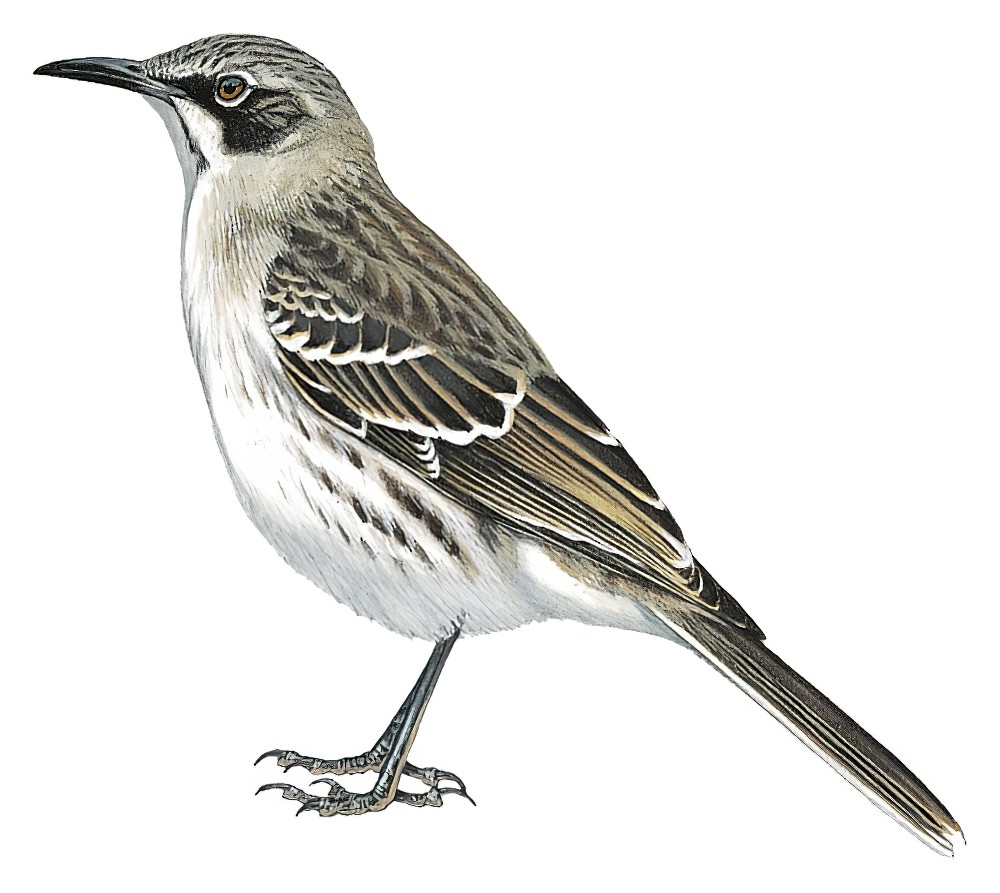San Cristobal Mockingbird / Mimus melanotis

San Cristobal Mockingbird
SCI Name:
Protonym: Orpheus melanotis Proc.Zool.Soc.London Pt5 no.50 p.27
Taxonomy: Passeriformes / Mimidae / Mimus
Taxonomy Code: chamoc2
Type Locality: the Galapagos.
Author: Gould
Publish Year: 1837
IUCN Status: Near Threatened
DEFINITIONS
MIMUS
(Mimidae; Ϯ Northern Mockingbird M. polyglottos) L. mimus mimic < Gr. μιμος mimos mimic; "Hernandez justly calls it the queen of all singing birds. The Indians, by way of eminence or admiration, call it cencontlatolly, or four hundred tongues; and we call it (though not by so elevated a name, yet very properly) the mock-bird, from its wonderful mocking and imitating the notes of all birds, from the humming-bird to the eagle" (Catesby 1731); "LE GRAND MOQUEUR ... MIMUS MAJOR ... il chante très-bien, & imite parfaitement le chant de tous les Oiseaux" (Brisson 1760): based on "Mimus" of Charleton 1668, "Mock-bird" of Catesby 1731, and other references; "Mimus Briss. Turdus polyglottus Lin. enl. 645. u.v.a." (Boie 1826); "Mimus Boie, 1826, Isis von Oken, p. 972. Type, by monotypy, Turdus polyglottos Linnaeus." (Davis & Miller in Peters 1960, IX, 442).
Var. Mimetes, Minus, Memus, Nemus.
Synon. Leucomimus, Mimodes, Nesomimus, Orpheus, Skotiomimus.
mimus
L. mimus mimic < Gr. μιμος mimos mimic.
MELANOTIS
(Mimidae; Ϯ Blue Mockingbird M. caerulescens) Specific name Turdus melanotis Temminck, 1830 (< Gr. μελας melas, μελανος melanos black; -ωτις -ōtis -eared < ους ous, ωτος ōtos ear); "573. Melanotis, Bp. (Mimus, p. Boie. - Orpheus, p. Sw. - Turdus, p. Gr.) Mexico. 1. TURDUS melanotis, Temm. nec Gould. (Orpheus caerulescens, Sw. - Melanotis caerulescens, Bp.) Pl. col. 498. ex Mexico." (Bonaparte 1850); "Melanotis Bonaparte, 1850, Consp. Gen. Av., 1, p. 276. Type, by monotypy, Turdus melanotis Temminck = Orpheus caerulescens Swainson." (Davis & Miller in Peters 1960, IX, 441).
melanotis
Gr. μελας melas, μελανος melanos black; -ωτις -ōtis -eared < ους ous, ωτος ōtos ear.
UPPERCASE: current genus
Uppercase first letter: generic synonym
● and ● See: generic homonyms
lowercase: species and subspecies
●: early names, variants, mispellings
‡: extinct
†: type species
Gr.: ancient Greek
L.: Latin
<: derived from
syn: synonym of
/: separates historical and modern geographic names
ex: based on
TL: type locality
OD: original diagnosis (genus) or original description (species)












